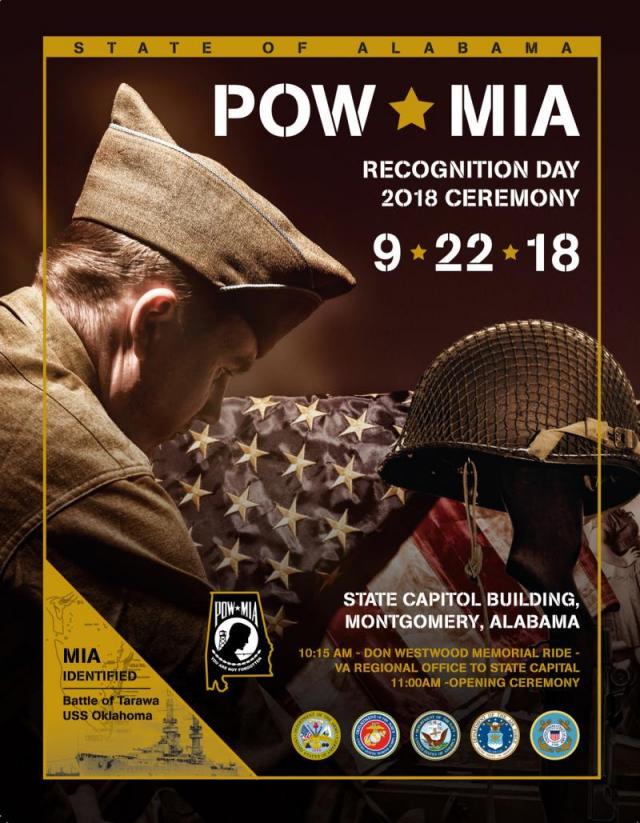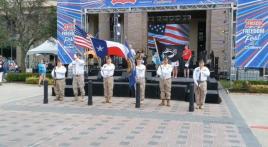You Are Not Forgotten—that’s the central phrase behind POW/MIA Recognition Day, a day to honor the sacrifices made by America’s prisoners of war, those who are still missing in action and their families.
A ceremony to mark National POW/MIA Recognition Day will be held September 22 on the south lawn of Alabama’s State Capitol. The day’s events, hosted by the American Legion of Alabama, Rolling Thunder of Alabama and various veterans service organizations, begins at 10:30 a.m. with a motorcycle POW/MIA Honor Ride from the VA Regional office to the capitol.
The point of POW/MIA Recognition Day is to ensure that American remembers to stand behind those who serve and to make sure we do everything we can to account for those who have never returned.
This year's guest speaker will be Capt. Gary Michael Rose, a Vietnam War medic who repeatedly risked his life and exposed himself to enemy fire to ensure the safe return of dozens of fellow soldiers during a bloody four-day mission in Laos.
Scores of the men in the company were wounded over those four days, but only three died, with Rose alone credited with treating as many as 70 wounded fighters. Captain Rose was awarded the Medal of Honor on October 23, 2017.
Maj. Gen. James Livingston—awarded the Medal of Honor for heroic actions in 1968 during the Vietnam War—will provide the keynote address. He served on active duty in the Marine Corps over 33 years before retiring on September 1, 1995.
General Livingston served as Commanding Officer, Company E. On May 2, 1968, the company launched a determined assault on the heavily fortified village of Dai Do, which had been seized by the enemy on the preceding evening isolating a Marine company from the remainder of the battalion. He maneuvered his men to assault positions across dangerous open rice paddy while under intense enemy fire.
Although wounded twice by grenade fragments, he refused medical treatment and led his men in the destruction of over 100 mutually supporting bunkers, driving the remaining enemy from their positions, and relieving the pressure on the stranded marine company. He then maneuvered the remaining effective men of his company forward, joined forces with the heavily engaged Marines, and halted the enemy's counterattack. Wounded a third time and unable to walk, he remained in a dangerously exposed area, deploying his men to more tenable positions and supervising the evacuation of casualties. Only when assured of the safety of his men did he allow himself to be evacuated.
“This annual program serves as our dedication to keep this cause in the forefront of the minds of elected officials and America at large,” Donna K. Stacey, state commander of the American Legion, said. “Although forensic science has improved significantly over the recent decades, time and the mortality of battle-site witnesses and surviving relatives add to the challenge to ensure we have a full accounting and repatriation of remains of our fallen U.S. service members lost in war.”
The American Legion and other veteran organizations support Joint POW/MIA Accounting Command activities to locate and repatriate all recoverable remains of U.S. military personnel who have died in captivity or are missing in action.
According to the Defense POW/MIA Accounting Agency (DPAA), 82,368 Americans are still considered missing, including 72,934 from World War II; 7,704 from the Korean War; 1,598 from Vietnam; 126 from the Cold War; and six from the Gulf Wars and other conflicts. Alabama has 1,116 still missing from WWII, 148 from the Korean War, 30 from the Vietnam War, two from the Cold War and one from the Iraq Theater.
Efforts to find those missing, identify them and bring them home are constant. For example, the DPAA said that in 2017, it accounted for 98 men missing during World War II, the Korean War and the Vietnam War.

You Are Not Forgotten
Montgomery, AL
June 12, 2018
Submitted by:
Belinda L Bazinet




